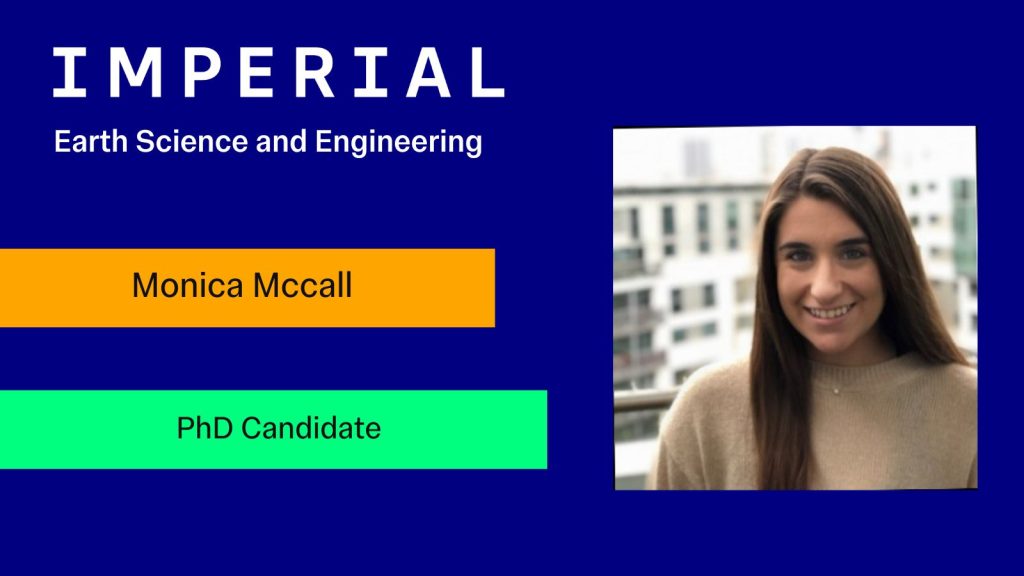COP29 kicks off next week, and as global leaders prepare to gather in Azerbaijan, finding innovative solutions to mitigate the effects of climate change remains more crucial than ever. Here at Imperial’s Department of Earth Science and Engineering, PhD student Monica Mccall is working to better understand the production of biochar – a material that can help combat climate change by contributing to long-term carbon sequestration and improving soil health for more sustainable agriculture.
In this blog post, Monica explains how her innovative research – which involves applying geoscience techniques as part of new strategies within the biochar field – could help pave the way for a more sustainable future for our planet.
• Describe your PhD project in a tweet:
I’m looking at new ways to analyse biochar, a material that can help store carbon for millennia!
• How do you see your research making an impact within and beyond academia?
My research can directly affect strategies for helping combat the climate crisis. The more we know about biochar, the more we can use it to our advantage as a carbon sink, an eco-friendly alternative to fertilizer, and as a way to improve the health of our soil and crops around the world.
• What sparked your interest in your research area?
I believe climate change is the most important issue our society (and future ones) will be faced with. I wanted my research to be part of the solution. During my master’s in environmental science, I was fascinated by the ability of nature to sequester carbon and the technical innovation that could leverage this advantage to change our future.
• Talk us through a typical day in your life as a PhD student. How do you maintain a healthy work-life balance?
Typical days don’t exist in PhD world, every day is different! You can usually find me in the organic geochemistry lab running experiments, writing some code, reading papers, or being a teaching assistant for an undergraduate module. To maintain a healthy work-life balance I try to take breaks in the day to have coffee or lunch with colleagues or I might go for a walk in Hyde Park. I enjoy running outdoors, yoga and cycling to help me to decompress.
• How do you navigate challenges and setbacks in your PhD journey?
I think it’s important to have a realistic mindset in your PhD that things won’t always go to plan. Talking to your friends about challenges is very helpful and lets you normalize that setbacks in research are actually very common. Everyone’s PhD journey is completely different, so it is important to try not to compare your progress with other students.
• How do you embody the values of ESE in your research and academic endeavours?
I’m actually the only person in my research group focusing on biochar (the others are all astrobiologists!). My research transforms some conventional techniques from other earth science fields into something innovative and new in the biochar space. I think this perfectly embodies the values of ESE, collaboration and innovation to create cutting-edge research.
• What motivated you to pursue your PhD at ESE?
I was drawn by the collaborative ties between ESE and the Grantham Institute for Climate and the Environment. As an international student, I was also excited by how international the department is.
• Are there specific resources or support systems at ESE that have helped you in your academic success?
Generally talking to colleagues has been a great support system.
• What advice would you give to prospective PhD students considering a similar research path?
A PhD is the very beginning of an academic career, and your thesis is not supposed to be an expert masterpiece! Remind yourself it’s okay to make mistakes, not be perfect and try new things. The PhD is a great time to start experimenting with the different facets of a career in academia. I’d encourage students to try teaching, outreach, publishing, etc to see what interests them most. Lastly, get to know some people outside of your department, it helps expand your perspectives and exposes you to other fields and new ideas.
• Where do you see yourself after completing your PhD?
I’m opening to lots of different opportunities. I really enjoy research and would love to continue as a researcher in some capacity.
• What do you do to wind down?
Yoga, cooking/baking and going for long walks around London.
• What are colleagues least likely to know about you?
I’ve recently gotten into knitting, and just knitted my first scarf!
